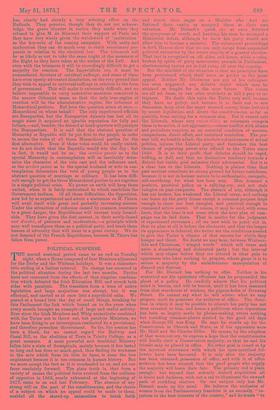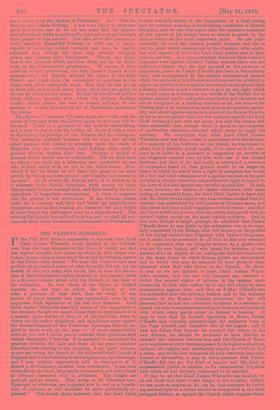POLITICAL SUSPENSE.
THE second sessional period came to an end on Tuesday night, when a House composed of four Members adjourned for the Derby and the Whitsun holidays. It was a character- istic ending of a listless interval. No change has occurred in the political situation during the last two months. Parties have not recovered from the effects of that singular combina- tion which defeated the Irish Education Bill, and struck both sides with paralysis. The transition from a time of active legislation and large majorities was abrupt, but it was effectual, and carried us at once into a superficial calm. We passed at a bound into the day of small things, breaking for this Parliament the link which bound us to the years when every month brought an example of large and useful activity. Ever since the Irish Members and Whig animalcuin combined with the Tories not to throw out, but paralyse Ministers, we have been living in an interregnum conducted by a provisional, and therefore powerless Government. So far, the session has been a blank, for we cannot regard the Railway and Canal Bill, or the abolition of Tests in Trinity College, as a great measure. A most powerful and beneficial Ministry fallen into a state of decreiitude, mainly because it has lasted so long and has done so much good, thus finding its weakness in the acts which form its title to fame, is none the less unpleasant because it is too common in human history. But we must accept the fact as it is vouchsafed to us, and set our faces resolutely forward. The plain truth is, that from a variety of causes the political force evolved from the collision of opposites in 1868, nearly exhausted at the beginning of 1872, came to an end last February. The absence of any strong will on the part of the constituencies, and the choice of a subject on which no appeal could be made to them, enabled all the stored-up animosities to break forth
and wreak their anger on a Minister who had not flattered their vanity or accepted them at their own valuation. Mr. Disraeli's quick eye at once detected the symptoms of revolt, and knowing his men, he arranged a Ministerial defeat, although he knew his party would not allow him to become a minister. The subsequent proceedings in both Houses show that we can only escape from suspended political animation by the severe remedy of a general election. That fact is recognised on all sides, and hence, while a calm, broken by spirts of party manceuvres, prevails in Parliament, electioneering tactics are in full swing all over the country. But the mischief of the situation is that no principles have been proclaimed which shall serve as guides in the great appeal. Neither Mr. Gladstone nor any of his colleagues has even suggested any definite object which may be attained or fought for in the near future. The voters are all set loose, to run after crotchets or fall a prey to in- triguers. No doubt this suits the Tories very well, because they have no policy, and because it is their cue to sow dissension, keep alive the anger aroused among those irritated by recent legislation, and divert the constituencies, as far as possible, from uniting for a common aim. But it cannot suit the Liberals, whose very raison (17tre as reformers compels them to be active, if not aggressive,—whose conflict with abuses and prejudices requires, as an essential condition of success, compactness, direct effort, and sustained resolution. The pre- sent lull, we frankly admit, the absolute colourlessness of actual politics, injures the Liberal party, and furnishes the best chance of regaining power ever offered to the Tories since 1840. It is to their profit that debates should be vapid, trifling, or dull, and that no distinctive tendency towards a distant but visible goal animates their adversaries. But it is a clear loss to the Liberals. Nothing is plainer than that past services constitute no strong ground for future confidence, because it is not in human nature to be enthusiastic, energetic, self-sacrificing, for what has been won. Men demand a positive, practical policy as a rallying-cry, and not stale eulogies on past conquests. The absence of aim, although it has not broken, has weakened the Liberal array, and nothing can brace up the party frame except a common purpose large enough to rouse our best energies, and practical enough to command active assent. Of course, it may be said, with some force, that the time is not come when the next plan of cam- paign can be laid down. That is matter for the judgment of experienced statesmen ; all we now wish to point out is, that no plan at all is before the electorate, and that the longer its appearance is deferred, the better are the conditions needed to give the Tories a chance of that success for which they hunger and thirst. No doubt we may hear, between Whitsun- tide and Christmas, "winged words" which will rouse and unite a slumbering and dislocated party ; but the interval which may elapse before they are uttered is clear gain to opponents who have nothing to propose, whose game it is to secure a majority by the ambidextrous manipulation of discord and distrust.
For Mr. Disraeli has nothing to offer. Neither in his oratorical nor his epistolary effusions has he propounded the ghost of a policy. He candidly admits that his political mind is barren, and will be barren, until it has been manured from that storehouse of wisdom, the pigeon-holes of Downing Street. He cannot say what he will advise, what he may propose, until he possesses the archives of office. The direc- tion in which it may be possible to educate his party has not been revealed to him, and hence a politician whose reputation
has been 80 largely made by phrase-making, utters nothing but sounding common-places minted in the good old days
when George III. was King. He says he stands up for the Constitution in Church and State, as if his opponents were Mr. Miall and Sir Charles Dilke. He means, by the adoption of that worn-out cry, to express a hope that the constituencies will kindly elect a Conservative majority, so that he and his friends may be placed in office. No other goal is aimed at by the mystical utterances with which his open-mouthed fol- lowers have been favoured. It is only after the majority has been obtained, possession of office, and with it of office archives, has been secured, that the good people who supply the majority will learn their fate. The primary end is plain enough ; but beyond that ardently desired acquisition all is doubt and darkness, with not a ray to illuminate the onward path of confiding electors. On one subject only has Mr. Disraeli made up his mind. He believes the exclusion of
women from the Parliamentary franchise is an anomaly, "in- jurious to the best interests of the country," and he trusts "to
see it removed by the wisdom of Parliament." But "Vote for Disraeli and Female Suffrage" is not a cry likely to carry any party into power, nor do we see any signs that the squires, who adore their leader so profoundly, have yet even got through their primer on this subject. Men who, after the speeches of 1866, voted for Household Suffrage in 1867, are, of course, capable of becoming sudden converts, and may be rapidly educated into taking the first step towards bringing
gowns and bonnets into Parliament. Except the aboli- tion of the anomaly which excludes them, we see no single item in the Conservative programme. Of course, if they acted up to their professions, the first Queen's Speech would announce that her Majesty advised the repeal of the Irish Church and Land Acts, the restoration of purchase in the Army, and other retrograde steps. But they do not act up to their talk, and indeed never know what they are going to do, nor be educated into doing. So that on this side of politics thick darkness prevails, save where the solitary farthing candle, which points the way to female suffrage, or the making of women into men by act of Parliament, penetrates the gloom.
The House of Commons will meet again next week, and the policy of breaking down the Liberal party by attrition will be resumed. There is a prospect of two months' skirmishing, and it may be one or two big battles, all directed with a view to destroying the prestige of the Premier and his colleagues. The inevitable sessional business will be done, but all the other pastime will consist in attempts upon the credit of Ministers who are confessedly only holding office until a general election decides their fate. Perhaps a period of genuine repose would not be undesirable. But we shall have no repose ; we shall see a bickering war conducted, on one side at least, solely with an eye to the ballot-boxes. Now, would it not be better to cut short this game at an early period, by taking up fresh ground and bringing the contest to an issue ? At all events, the Liberal party, if it desires to be a coherent body, should determine what among its many objects shall be next accomplished, and fight steadily for that, regardless of immediate consequences. A state of suspense like the present is not wholesome. If the Liberals cannot unite for a common end, they had better go manfully into Opposition, and in that bracing air elaborate the plan which at some future day shall again carry us a stage forward. The existing Parliament has outlived its prime, and we shall all wel- come the hour when its successor is summoned to Westminster.



































 Previous page
Previous page